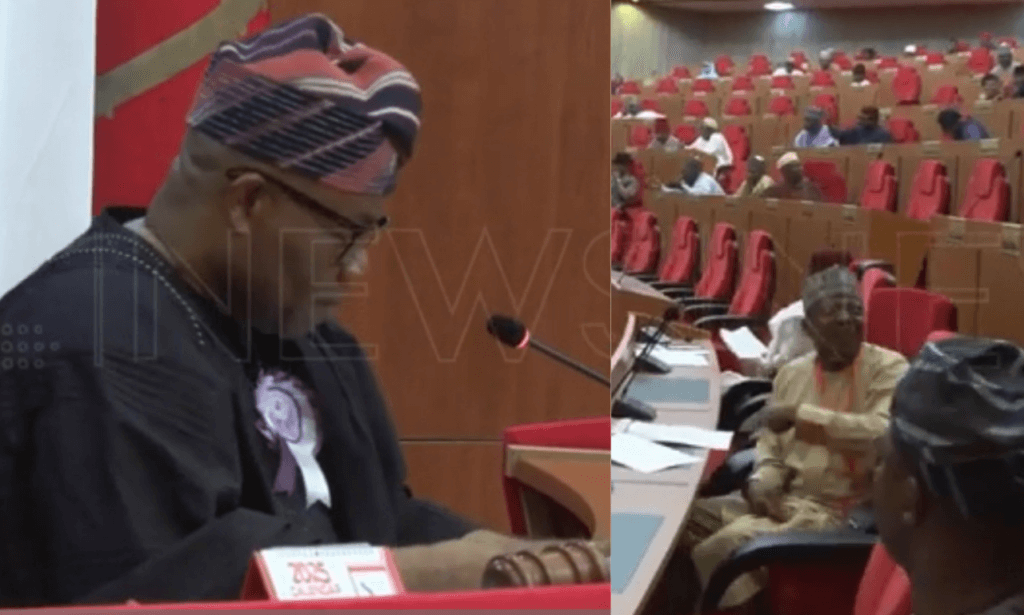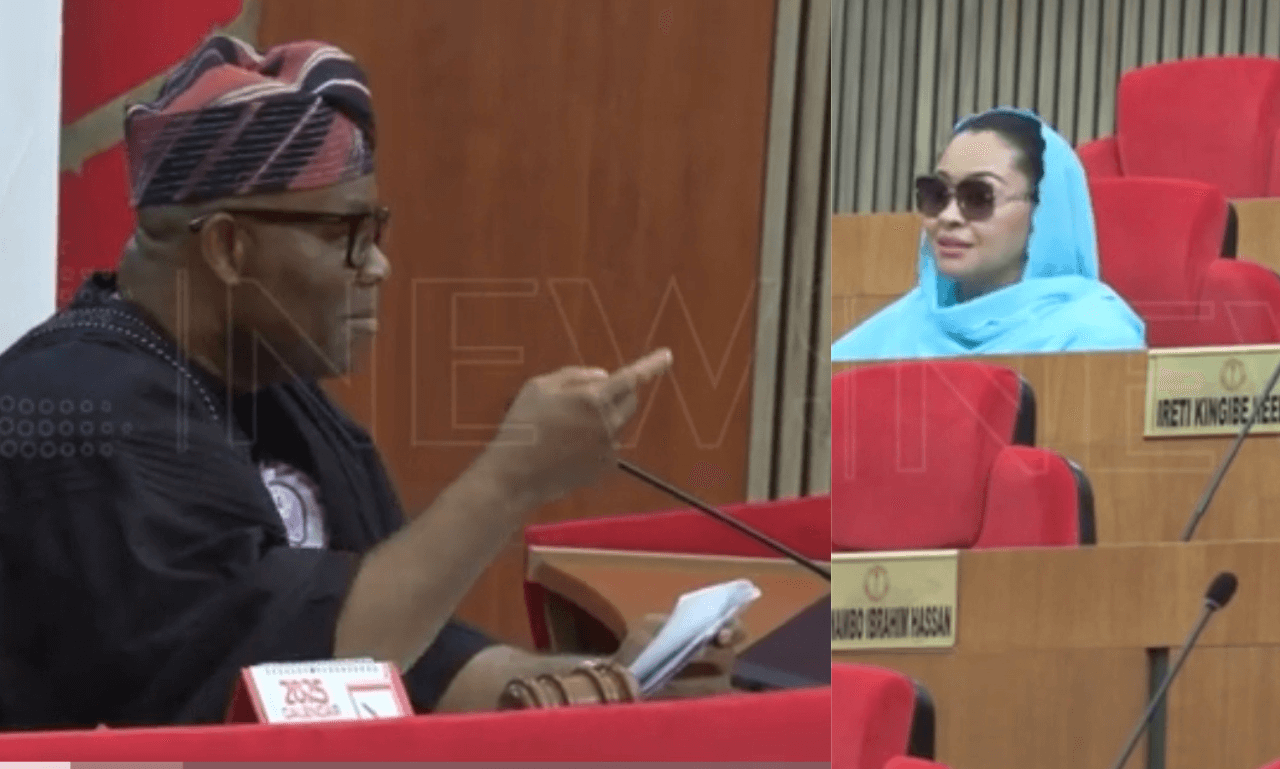In a dramatic turn of events that has sent shockwaves through the Nigerian political arena, the Senate has suspended Senator Natasha Akpoti-Uduaghan for six months following a finding that she violated the Senate’s rules. This decision comes in the wake of a highly publicized dispute between Senator Natasha and Senate President Godswill Akpabio, during which she leveled serious accusations against him. According to reports, Senator Natasha accused Akpabio of sexual harassment and abuse of office—a claim that the Senate president has repeatedly denied. The controversy reached a boiling point as the matter was brought before the Committee on Ethics, Privileges, and Code of Conduct.
The Senate President, Godswill Akpabio, read out the committee’s recommendations on Thursday, stating that the suspension was imposed due to her “total violation of the Senate Standing Rules (2023 as amended)” and for bringing the entire Nigerian Senate to public opprobrium. Despite several senators pushing for a shorter suspension period of three months, a majority vote ultimately upheld the six-month penalty. The Senate has also made it clear that the suspension may be reduced or even lifted if Senator Natasha submits a written apology to the Senate before a reconsideration can take place.
The decision to suspend Senator Natasha is layered with complexity. On one level, it is a straightforward enforcement of the Senate’s disciplinary measures. On another, it is deeply intertwined with a bitter personal and political dispute. The incident that set off the entire controversy began on February 20, 2025, when a disagreement over seating arrangements in the chamber escalated tensions between Senator Natasha and Senate President Akpabio. What might have been a minor dispute quickly snowballed into a major political battle when Senator Natasha publicly accused the Senate president of sexual harassment and alleged misconduct. Her actions, which included submitting a petition on the floor of the Senate, ignited a firestorm of controversy and division within the upper chamber.
Open a verified Fiverr account now!!!
The petition that Senator Natasha submitted was initially dismissed by the Senate Committee on Public Conduct, Ethics, Privileges, and Public Petitions, which is headed by Neda Imaseun of Edo South. The committee criticized the petition on procedural grounds, noting that Senator Natasha had personally signed it instead of having it endorsed by others as required by due process. Because of this breach, the petition was declared “dead on arrival” and the committee quickly moved to recommend disciplinary action against her. Even though she re-submitted the petition hours later in a bid to have her concerns heard, the committee’s recommendation for suspension remained unchanged.
The Senate’s ruling was swift and decisive. Not only was Senator Natasha suspended for six months and barred from the National Assembly during that period, but the Senate also decided to lock her office as part of the disciplinary measures. In an unexpected move that diverged from the committee’s original recommendation, the Senate ruled that her legislative aides should continue to receive their salaries during her suspension. As one senator put it, “The aides of Natasha are not Natasha,” highlighting the sentiment that while the lawbreaker must be held accountable, the innocent should not suffer collateral damage.
The fallout from this suspension has been immediate and intense. Following the announcement, Senator Natasha was escorted out of the chamber by the Sergeant-At-Arms. However, before leaving, she vehemently declared that “this injustice would not be sustained,” signaling her intent to challenge the decision. The suspension marks the culmination of weeks of public disputes, heated exchanges, and legal maneuvering between her, Senate President Akpabio, and other members of the Senate. It is a saga that has captured national attention and exposed deep divisions within the political class.
ALSO CHECK: Affordable products
Many analysts see this suspension as a turning point in the Senate’s internal dynamics. Some believe it is a necessary step to restore order and uphold the integrity of the legislative body, while others view it as a politically motivated move aimed at silencing dissent. The fact that some senators attempted to reduce the suspension period to three months suggests that there is an ongoing debate within the Senate about the appropriate level of punishment for what is seen as a serious breach of conduct.

Photo credit:TVC News
At its core, this controversy is about more than just one senator’s behavior. It reflects longstanding tensions over the balance of power within the Senate and raises questions about accountability, due process, and the role of personal grievances in public office. For many Nigerians, the saga of Senator Natasha’s suspension has become a symbol of the broader challenges facing the country’s political system. Critics argue that the incident undermines public confidence in the Senate and casts a long shadow over the institution’s ability to govern effectively. Meanwhile, supporters of the ruling insist that strong disciplinary measures are necessary to maintain the credibility of the legislative process.
The political fallout is likely to be significant. As the Senate prepares to continue its session after a period of heated debate, many lawmakers are already positioning themselves for the next round of political battles. The suspension could have far-reaching implications for legislative negotiations and may influence how other senators approach issues of personal conduct and public accountability in the future. There is a palpable sense of uncertainty about what this means for the future of the Senate and for Nigeria’s political stability as a whole.
LEARN MORE: Read blogs and articles here!!!
For Senator Natasha, the path forward is fraught with challenges. The requirement that she submit a written apology in order to have her suspension reconsidered adds an additional layer of complexity to her situation. Such an apology could be seen as a personal admission of wrongdoing and may have lasting implications for her political career. Yet, if she chooses not to apologize, she faces a mandatory six-month suspension that will remove her from the legislative process at a critical time. This decision is not simply about punishment—it is a test of her resolve and her ability to navigate a highly charged political environment.
Observers note that this incident could have a chilling effect on other lawmakers who might be tempted to use personal grievances as a political weapon. The Senate’s decision sends a clear message that while dissent and confrontation are part of a healthy democratic process, there are limits to what is acceptable, and violations of the standing rules will be met with strict penalties. In this context, the suspension could be interpreted as a step toward ensuring greater accountability and discipline within the legislative body, thereby strengthening the institution in the long run.
However, the timing of the suspension is also a matter of concern for many. With the political landscape in Nigeria already volatile and the nation facing numerous economic and social challenges, removing an experienced lawmaker from the Senate for an extended period could have unintended consequences. Some analysts warn that this move might further polarize political factions and make it more difficult to achieve consensus on pressing national issues. The long-term impact on legislative productivity and the effectiveness of governance remains to be seen.
ALSO READ: Interesting stories
The controversy surrounding Senator Natasha’s suspension is a microcosm of broader issues in Nigerian politics. It highlights the complex interplay between personal ambition, institutional integrity, and the ever-present challenge of maintaining order in a diverse and often divided political landscape. As the Senate moves forward, the outcome of this dispute will be closely watched by political observers, media, and the general public. It is a stark reminder that in the world of politics, even a single incident can have far-reaching implications for governance, public trust, and the stability of democratic institutions.
As the nation grapples with these internal conflicts, there is also an underlying call for reforms. Many believe that clear, consistent, and transparent rules for handling disputes among lawmakers are essential to prevent future controversies. The Senate’s decision in this case may prompt discussions about how best to balance accountability with fairness and whether additional safeguards are needed to protect the rights of individual senators while ensuring that the institution as a whole maintains its credibility.
The coming months will be critical as the Senate reviews its disciplinary procedures and as Senator Natasha considers her next steps. Will she choose to issue the required written apology and attempt to have her suspension reduced? Or will she continue to challenge what she sees as an unjust decision? The answer to this question will likely influence the broader political dynamics within the Senate and could set a precedent for how similar disputes are handled in the future.
Start Trading Your Crypto with Bybit Now!!!
For now, the suspension of Senator Natasha Akpoti-Uduaghan stands as a powerful reminder of the high stakes involved in political life. It underscores the importance of upholding institutional rules and the potential costs of allowing personal disputes to escalate into matters of public policy. In an environment where every action is scrutinized and every decision can have significant repercussions, this incident serves as both a warning and a call to action for all public officials.
As Nigeria continues to navigate its complex political landscape, the way in which the Senate handles internal disputes like this will be critical to restoring faith in the legislative process and ensuring that the country’s democratic institutions remain robust and effective. The outcome of this case will not only impact the immediate careers of those involved but may also shape the future direction of Nigerian politics for years to come.
In summary, the Senate’s decision to suspend Senator Natasha for six months is a pivotal moment that reflects deeper issues of accountability and conduct in Nigerian politics. It is a decision that carries both immediate and long-term implications for the legislative process and the broader political environment. As the nation watches closely, all eyes are on President Zelensky of the Senate and the steps that will be taken to resolve this contentious matter. The hope is that through constructive reforms and a renewed commitment to transparency, the Senate can emerge from this crisis stronger and more united, better equipped to address the challenges facing Nigeria today.
Recommended Broker for Forex Traders!!!

